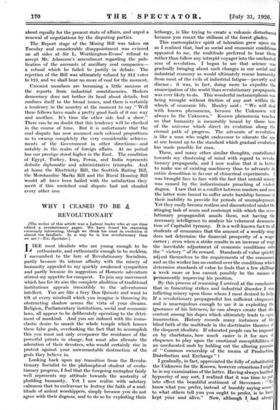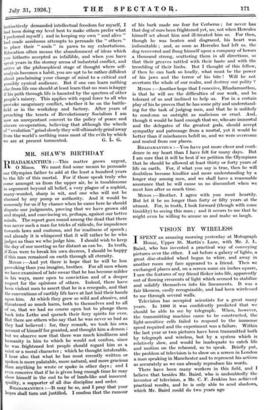WHY I CEASED TO BE A REVOLUTIONARY [The writer of
this article was a Labour leader who at one time edited a revolutionary paper. We have found his reasoning extremely interesting, though we think his trust in evolution is almost too fatalistic. In a way he is less revolutionary than we aro !—En. Spectator.] LIKE most idealists who are young enough to be enthusiastic, and enthusiastic enough to be reckless, I succumbed to the lure of Revolutionary Socialism, partly because its intense affinity with the misery of humanity appealed to my quickly awakened sympathies and partly because its suggestion of Homeric adventure stirred my appetite for conquest. To join any movement which has for its aim the complete abolition of traditional institutions appeals irresistibly to the adventurous intellect. You are like a fiery Don Quixote and want to tilt at every windmill which you imagine is throwing its obstructing shadow across the vista of your dreams. Religion, Parliamentary institutions, social and economic laws, all appear to be deliberately operating to the detri- ment of mankind. And you are imbued with the icono- clastic desire to smash the whole temple which houses these false gods, overlooking the fact that to accomplish this you must not only overpower the resistance of the powerful priests in charge, but must also alienate the adoration of their devotees, who would certainly rise in protest against your unwarrantable destruction of the gods they believe in.
Looking back upon my transition from the Revolu- tionary Socialist to the philosophical student of evolu- tionary progress, I feel that the foregoing metaphor fairly well represents my attitude towards the austerity of plodding humanity. Yet I now realize with salutary calmness that to endeavour to destroy the faith of a mul- titude of ardent worshippers, simply because you do not agree with their dogmas, and to do so by exploiting their lethargy, is like trying to create a volcanic- disturbance because you resent the stillness of the forest glades.
This contemplative spirit of toleration grew upon me as I realized that, bad as social and economic conditions appeared to me, the multitude preferred to bear them rather than follow any intrepid voyager into the uncharted seas of revolution. I began to see that science was gradually bringing about such changes in our social and industrial economy as would ultimately rescue humanity from most of the evils of industrial fatigue—poverty and disease ; it was, in fact, doing more to expedite the emancipation of the world than revolutionary propaganda was ever likely to do. This wonderful metamorphosis was being wrought without friction of any sort within the wheels of economic life. Huxley said : " We will deal with known phenomena, because the Unknown will always be the Unknown." Known phenomena teaches us that humanity is inexorably bound by those laws of the universe which direct its evolution along the eternal path of progress. The advocate of revolution is like a man who might endeavour to educate the ape at one bound up to the standard which gradual evolution has made possible for man.
These, and many other similar thoughts, contributed towards my chastening of mind with regard to revolu- tionary propaganda, and I now realize that it is better to make use of existing machinery than to advocate its entire demolition in favour of chimerical experiments. I was brought face to face with the fact that untold misery was caused by the indiscriminate preaching of violent dogma. I saw that in a conflict between masters and men the latter were bound to suffer acute hardship because of their inability to provide for periods of unemployment Yet they easily become restless and discontented under the stinging lash of scorn and contempt with which the revo- lutionary propagandist assails them, not having the necessary intelligence to analyse his vehement denuncia- tion of Capitalist tyranny. It is a well-known fact to all students of economics that the amount of a weekly wage does not determine the financial prosperity of a wage.
earner ; even when a strike results in an increase of wage the inevitable adjustment of economic conditions robs the " victory " of its reward. Standards of value quickly adj ust themselves to the requirements of the consumer, and as the worker has no control over-the condition.s which determine standards of value he finds that a few shillings a week more or less cannot possibly be the means of permanently improving his position.
By this process of reasoning I arrived at the conclusion that in fomenting strikes and industrial disorder I was inflicting misery upon those whom I most desired to help.
If a revolutionary propagandist has sufficient eloquence, and is unscrupulous enough to use it in exploiting the ignorance of his listeners, he can always create that dis- content among his dupes which ultimately leads to open insurrection. History records many instances of the blind faith of the multitude in the doctrinaire theories of the eloquent idealists. If educated people can be imposed on by charlatans, how much easier is it for men of eloquence to play upon the emotional susceptibilities of an uneducated mob by holding out the alluring promise of " Common ownership of the means of Production, Distribution and Exchange" 1 I gradually, in fact, appreciated the folly of substituting the Unknown for the Known, however censorious I might be in my examination of the latter. Having always loathed hypocrisy of any sort, I realized that it was time to put into effect the beautiful sentiment of Stevenson : know what you prefer, instead of humbly saying amen to what others tell you you ought to prefer, is to have kept your soul alive." Now, although I had alwa31 instinctively demanded intellectual freedom for myself, I had been doing my level best to make others prefer what I preferred myself ; and in keeping my own " soul alive " had made assiduous attempts to persuade the " others " to place their " souls " in pawn to my exhortations. Education often means the abandonment of ideas which you hitherto accepted as infallible, and when you have spent years in, the stormy arena of industrial conflict, and arrive at the philosophical stage of thought where self- analysis becomes a habit, you are apt to be rather diffident about proclaiming your change of mind to a critical and possibly cynical audience. But if one can learn nothing else from life one should at least learn that no man is happy if his path through life is haunted by the spectres of other people's misery. This applies with equal force to all who provoke sanguinary conflict, whether it be on the battle- field or in the workshop and factory. After years of preaching the tenets of Revolutionary Socialism I am now an unrepentant convert to the policy of peace and sincere co-operation, believing that although the wheels of " evolution " grind slowly they will ultimately grind away from the world's seething mass most of the evils by which



































 Previous page
Previous page